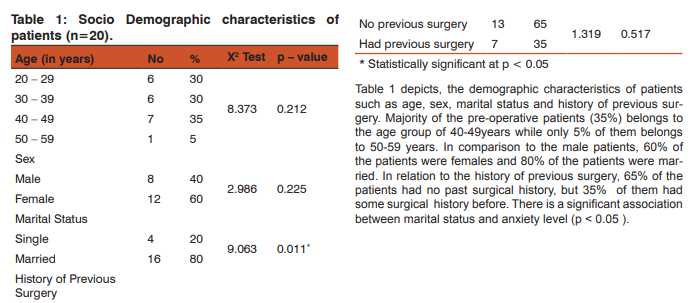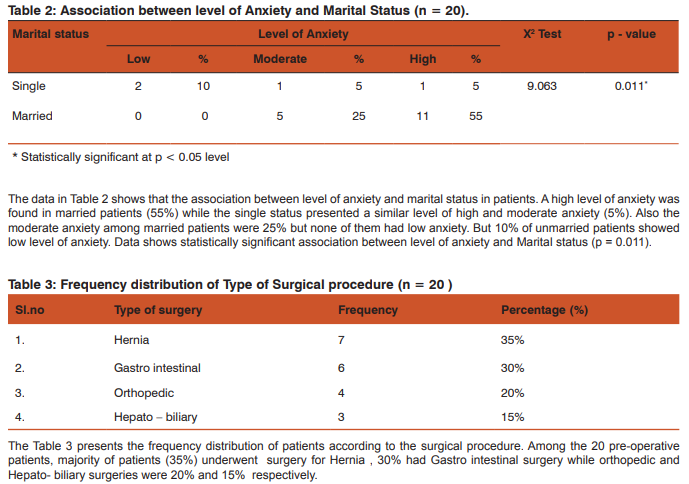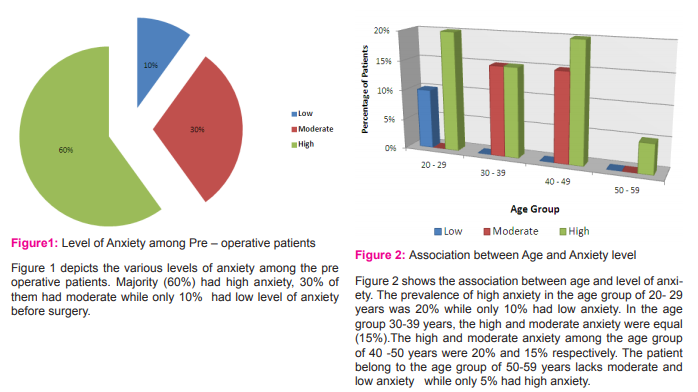IJCRR - 6(22), November, 2014
Pages: 42-46
Date of Publication: 21-Nov-2014
Print Article
Download XML Download PDF
EVALUATING THE LEVEL OF ANXIETY AMONG PRE-OPERATIVE PATIENTS BEFORE ELECTIVE SURGERY AT SELECTED HOSPITALS IN KINGDOM OF SAUDI ARABIA
Author: Priya Gangadharan, Reemas Ali Mohemed Assiri, Feddah Ahemed Ali Assiri
Category: Healthcare
Abstract:Background: Patients who undergo surgery usually experience an intense level of anxiety in the pre-operative period. The objective of the study was to assess various levels of anxiety and find out its association with selected demographic variables. Methods: A Descriptive study was performed with 20 inpatients scheduled for elective surgery. Age ranged from 20 to 60 years. Demographic information was collected using a structured questionnaire. The measuring instrument to assess the patient's anxiety was State- Trait Anxiety Inventory (STAI).
Results: Among the pre operative patients , majo rity had High anxiety ( 60%), 30% of them had moderate and only 10% had low anxiety before surgery. There was no difference in state and trait anxiety among patients. Women (45%) had higher baseline state and trait anxiety than men(15%). Selected demographic variables were associated with anxiety levels and found that marital status had significant association with various levels of anxiety (p< 0.05).
Conclusion: The STAI is a useful instrument to assess the level of patients' preoperative anxiety and the need for information. Measuring anxiety before any surgery helps the patient to alleviate their worries to some extent with the support of health care professionals.
Keywords: Anxiety; Pre-operative patients; Elective surgery; Level of Anxiety
Full Text:
INTRODUCTION
Many patients experience substantial anxiety before operation and this is reported to affect 60–80% of surgical patients. Anxiety also increases the requirement of anesthetic drugs to produce unconsciousness and therefore may indirectly increase the risk of awareness. This feeling remains common today despite advances in medicine and surgical techniques. It is the responsibility of healthcare professionals to ensure that any patient undergoing an elective surgical procedure is both physically and psychologically prepared. However, with increasing demands on the health service to be more efficient, little time is set aside to meet the psychological needs of the surgical patient. Anxiety may also worsen patients’ perception of pain and increase requirements for postoperative analgesia. Anxiety may decrease patients’ overall satisfaction with peri operative care. Reducing preoperative anxiety may improve surgical outcome, shorten hospital stay, and minimize lifestyle disruption.(1) Since the early days of surgery patients have been anxious about undergoing operations. This feeling remains common today despite advances in medicine and surgical techniques. It is the responsibility of healthcare professionals to ensure that any patient undergoing an elective surgical procedure is both physically and psychologically prepared.(2). Patients coming into hospital can suffer a great deal of anxiety who undergo surgery experience acute psychological distress in the pre-operative period. These fears manifest themselves as uncertainty, loss of control and decreased self-esteem, anticipation of postoperative pain, and fear of separation from family (3).
An aversive hospital environment may increase anxiety and negatively influence health outcomes also increased preoperative anxiety is associated with poor postoperative behavioral and clinical recovery. Some degree of anxiety is a natural reaction to the unpredictable and potentially threatening circumstances typical of the preoperative period, especially for the patient’s first few surgical experiences. (8) and (20). High levels of pre- operative anxiety have un favorable effects on induction and maintenance of anesthesia as well as on the recovery from anesthesia and surgery. (9) Surgery is commonly regarded as a psychologically stressful experience that requires appraisal and coping responses. Stress occurs when a situation has appraised as demanding and as having the potential to exceed coping resources. (10) Objectives: • To assess various levels of anxiety among pre-operative patients. • To find out the association between anxiety and the selected demographic variables.
Study Design:
Descriptive Design was adopted for the study. Hypotheses:
1. Patients who undergo any surgical procedure may have increased level of anxiety
2. There may be significant association between level of anxiety and selected demographic variables.
MATERIALS AND METHODS
Designs and settings: The research design used for the study was Descriptive design. The setting consisted of the male and female preoperative wards of Muhyl General Hospital, Regal Alma, and Magarda Ministry Hospitals. The study was conducted from 14th March 2013 to 15th April 2013. Samples: The samples were selected by using Convenient sampling technique. Patient who had history of Psychiatric disorders and Neurological problems were excluded. The total number of samples were 20. Patients age ranged between 20 and 60 years. The proportion of the Male and female samples were 40% and 60% respectively. Majority (80%) of the samples were married and 65% of them had previous surgical history. Instruments: 1. Tool I: This tool consists of background information of patients on selected items include Age, sex, marital status and previous history of surgery. 2. Tool II: State Trait anxiety inventory (STAI) The STAI-state (STAI-S) form consists of 20 statements, and the answers to these are used to determine a patient’s current anxiety level; the STAI-trait (STAI-T) form consists of a different set of 20 statements, and the answers to these are used to determine a patient’s underlying anxiety level. Each statement in the STAI-S is rated on a four-point scale for the subject’s agreement with that statement (not at all, somewhat, moderately so, and very much so). Statements in the STAI-T are also rated on a four-point scale (almost never, sometimes, often, and almost always). This form was used for each participant on entering the study . The overall (total) score for STAI ranges from a minimum of 20 to a maximum of 80; STAI scores are commonly classified as ‘no or low anxiety’ (20–37), ‘moderate anxiety’ (38–44), and ‘high anxiety’ (45–80) (H. A. Jlala, et al ). Ethical Considerations and Human Rights The Research proposal was approved by the ethics committee of the College and hospital authorities. Patients were well informed about the purpose of this research and their rights to withdraw or refuse at any time during the study period. Also ensured them about the confidentiality of the obtained information. Statistical Analysis The data gathered through different techniques has been compiled by adopting suitable statistical methods. After categorization, the data frequencies were computed for demographic variables to decide the distribution prototype of patients into each level.. Similarly frequencies were calculated for level of anxiety among the patients. The distribution pattern is depicted through appropriate graphical methods. The results are inferred through statistical techniques like Descriptive and Inferential Statistical methods like Mean, SD and ‘Chi’-square test ( used to find out the association between anxiety and selected demographic variables like age, sex, marital status and past history of surgery). Results Table 1 presents ,the pre - operative patient’s anxiety levels and its associations with selected demographic variables such as age, sex, marital status and patients history of previous surgeries were measured and the findings drawn accordingly. The data mentioned in Table 2 shows that, a high level of anxiety was found in married patients (55%) while the single status presented a similar level of high and moderate anxiety (5%). Also the moderate anxiety among married patients were 25% but none of them had low anxiety. But 10% of unmarried patients showed low level of anxiety. Data shows statistically significant association between level of anxiety and Marital status (p = 0.011). As shown in Table 3, among the 20 pre-operative patients, majority of patients (35%) underwent surgery for Hernia , 30% had Gastro intestinal surgery while orthopedic and Hepato- biliary surgeries were 20% and 15% respectively. There was no difference in state and trait anxiety among patients. Women (45%) had higher baseline state and trait anxiety than men (15%). Regarding the level of anxiety among the patients , majority had High anxiety ( 60%), 30% of them had moderate and only 10% had low anxiety before surgery (Fig.1) The prevalence of high anxiety in the age group 20- 29 years was 20% while only 10% had low anxiety. In the age group 30-39 years, the high and moderate anxiety were equal (15%).The high and moderate anxiety among the age group of 40 -50 years were 20% and 15% respectively. None of the patient belongs to the age group of 50-59 years had moderate and level of low anxiety while 5% of them had high level of anxiety (Fig 2 ). Discussion Operations can restore health and even save life, but it is normal to feel a bit anxious about “going under the knife”, especially the day or two beforehand, which are often spent in the hospital preparing for the operation. (6) Anxiety may cause physical symptoms such as a pounding or racing heart, an irregular pulse, nausea and sleeplessness. These symptoms can sometimes end up causing more anxiety, because they may be wrongly interpreted as a sign that the illness is getting worse.(7) Preoperative anxiety is a common phenomenon among indoor surgical patients. A lot can be done to alleviate this anxiety by improving doctor-patient communication. Better doctor-patient communication which involves information sharing about the surgical procedure, patient satisfaction, attention to queries by the patient and trust in the physician was associated with lower anxiety levels. (10) Change of environment, waiting time of surgery, postoperative pain, fear of one’s life, nil per mouth, blood transfusion, fear of unknown, getting stuck with needles and awareness during surgery were the significant factors responsible for increase preoperative anxiety in women as compared to males.(12) Effective communication is the cornerstone of good healthcare yet it can be a difficult skill to master. Poor communication can have serious consequences for patients and cause irreparable damage to the nurse-patient relationship. Nurses can use communication skills to help reassure patients before surgery.(17) The present study examines the various levels of anxiety among patients before surgery and its association on some of the selected variables. The prevalence of high anxiety in the age group 20- 29 years was 20% while only 10% had low anxiety. In the age group 30-39 years, the high and moderate anxiety were equal (15%).The high and moderate anxiety among the age group of 40 -50 years were 20% and 15% respectively. The patient belong to the age group of 50- 59 years lacks moderate and low anxiety while only 5% had high anxiety. Among the pre operative patients , majority (60%) had High anxiety,30% of them had moderate and only 10% had low anxiety before surgery. There were limitations in the present study: i. More research can be conducted on specific interventions to reduce pre operative anxiety and assess its effectiveness post operatively. ii. Sample size of the present study is limited to 20. iii. In this research we administered one measurement scale ie, STAI , and it would be better if applied more instruments to determine the accurate scale.
CONCLUSION
The present research investigated various types of anxieties a patient would undergo before any surgical procedure. The study highlighted the association between anxiety and selected demographic variables. More research is required to find out the specific strategies or interventions to alleviate anxiety before surgery.
ACKNOWLEDGEMENT
Authors would like to express their gratitude towards Department of Nursing,College of Applied Medical Sciences, King Khalid university, Mohyl and Hospital management for their constant support encouragement for the successful completion of the study and utilizing the facilities. Authors acknowledge the immense help received from the scholars whose articles are cited and included in references of this manuscript. The authors are also grateful to authors / editors / publishers of all those articles, journals and books from where the literature for this article has been reviewed and discussed. They are also thankful to the subjects of this study for their valuable participation. Authors also grateful to IJCRR editorial team and reviewers to bring quality of this manuscript.
References:
1. Pritchard M. Measuring anxiety in surgical patients using a visual analogue scale. Nurs Stan 2010 Nov 17; 25 (11): 40-4
2. Vadla D, Bozikov J, Blazekovi?-Milakovi? S, Kovaci? L. Anxiety and depression in elderly-prevalence and association with health care. LLijec Vjesn. 2013 MayJun;135(5-6):134-8.
3. Kain ZN, Mayes LC, Caldwell-Andrews AA, Karas DE, McClain BC. Preoperative anxiety, postoperative pain, and behavioral recovery in young children undergoing surgery. Pediatrics.2006 Aug;118(2):651-8.
4. Laufenberg Feldmann R, Kappis B Assessing preoperative anxiety using a questionnaire and clinical rating: A prospective observational study. Eur J Anaesthesiol.2013 Dec; 30(12):758-63.
5. Timothy M. Osborn and Noah A. Sandler. The effect of anxiety on intravenous sedation Anesth Prog 2004;51(2): 46–51
6. Jawaid M, Mushtaq A, Mukhtar S, Khan Z. Preoperative anxiety before elective surgery. Neurosciences 2007;12 (2).
7. L. Ebirim, M Tobin, Factors responsible for Pre-operative anxiety in Elective surgical patients at a university teaching hospital : A pilot study. The internet journal of Anesthesiology 2010; 29 (2).
8. Marsha L. Harbin. A comparative study of the effects of environment on preoperative anxiety and pain level and postoperative outcomes of an outpatient population. Dissertation Abstracts International 2007 ; 67-11: 6298.
9. Wang SM , Kulkarni L, Dolev J, Kain ZN. Music and preoperative anxiety: a randomized, controlled study. Anesth Analg 2002 Jun;94(6):1489-94
10. Vandana B. Nikumb, Amitav Banerjee, Gurleen Kaur, and Suprakash Chaudhury. Impact of doctor-patient communication on preoperative anxiety: Study at industrial township. Ind Psychiatry J. 2009 Jan-Jun; 18(1): 19–21.
11. Guo P, East L, Arthur A. A preoperative education intervention to reduce anxiety and improve recovery among Chinese cardiac patients: a randomized controlled trial. Int J Nurs Stud 2012 Feb; 49(2) :129-37.
12. Zubia Masood, Jahanzaib Haider, Masood Jawaid, Shams Nadeem Alam. Preoperative anxiety in female patients: The issue needs to be addressed. KUST Med J 2009; 1(2): 38-41
13. Wetsch WA, Pircher I, Lederer W, Kinzl JF, Traweger C, Heinz-Erian P, Benzer A.Preoperative stress and anxiety in day-care patients and in patients undergoing fast-track surgery. Br J Anaesth 2009 Aug;103(2):199-205.
14. Pritchard MJ. Managing anxiety in the elective surgical patient. Br J Nurs 2009 Apr;18(7):416-9.
15. Alvisa Palese, Marta Cecconi, Renzo Moreale and Miran Skrap. Pre-operative Stress, Anxiety, Depression and Coping Strategies Adopted by Patients Experiencing Their First or Recurrent Brain Neoplasm: An Explorative Study. Stress and Health. 2012 Nov;28(5) :416–425.
16. Mitchell M. Patient anxiety and modern elective surgery: a literature review. J Clin Nurs. 2003 Nov;12(6):806-15.
17. Pritchard MJ. Reducing anxiety in the elective surgical patient. Nursing times.net 2011
18. Kruzik N. Benefits of preoperative education for adult elective surgery patients. AORN J. 2009 Sep; 90(3):381-7.
19. H. A. Jlala1, J. L. French, G. L. Foxall, J. G. Hardman and N. M. Bedforth. Effect of preoperative multimedia information on perioperative anxiety in patients undergoing procedures under regional anaesthesia . Br J Anaesth 2010 Feb; 104 (3): 369–74
20. Harbin, Marsha L.A comparative study of the effects of environment on preoperative anxiety and pain levels and postoperative outcomes in an outpatient population (dissertation).Capella University; 2007



|






 This work is licensed under a Creative Commons Attribution-NonCommercial 4.0 International License
This work is licensed under a Creative Commons Attribution-NonCommercial 4.0 International License